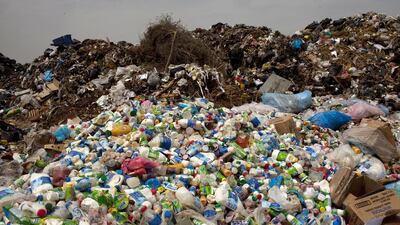DUBAI // The amount of food waste that goes to landfill in the UAE could be significantly reduced if more people used food-disposal machines in their homes.
According to Dubai Municipality, 1,850 tonnes of food waste is thrown away each day during Ramadan in the emirate.
This, in turn, finds its way to landfills and results in increased environmental problems.
“The problem with throwing away food waste in the bin is that there is an environmental cost associated with the collection and disposal of this kind of refuse,” said Mohammed Karam, business development manager for InSinkErators, Middle East and Africa.
“Food waste disposers grind food waste into tiny particles that then go into the sewage system and can be easily dealt with at water treatment sites.”
In Dubai, food waste makes up 55 per cent of the waste produced by households.
A 2102 YouGov survey found that 78 per cent of people surveyed in the UAE and Saudi Arabia admitted to throwing away food each week to make room for new groceries. Two-thirds of those in the UAE failed to see that food waste was a serious environmental problem.
“Not only do food disposers help the environment but they also improve hygiene in the kitchen by getting rid of bacteria and foul odours,” said Mr Karam.
Less than 1 per cent of UAE homes have a food disposal unit, or garburators as they are called in some countries, installed.
That is significantly lagging behind 55 per cent of homes in US, New Zealand at 37 per cent, China at 20 per cent and the UK with 7 per cent.
“We have been in the UAE for about two years with our products so there is a long way to go, but our aim is to get that number up to 20 per cent,” Mr Karam said.
“The key thing for us is to change people’s habits so that if food is being disposed of then it’s done in a way that is not harmful to the environment.
“It is a simple thing to do but it makes a huge difference to the environment.
“But I think the tide is turning as we have seen them being installed in some hotels, as well as properties on Reem Island [Abu Dhabi].”
InSinkErators are a range of food disposers made by Emerson. They start at Dh1,299 for a basic model to Dh2,499 for a more advanced version.
The machines work by grinding foodstuff into tiny particles.
A micro processor built into the unit can also detect what type of food is being disposed of.
“It can even detect if, for example, a spoon has fallen in by mistake,” said Mr Karam.
“The grinders will run two or three times but, after that, it will stop to allow the object to be removed by hand and prevent the motor from burning out.”
nhanif@thenational.ae

